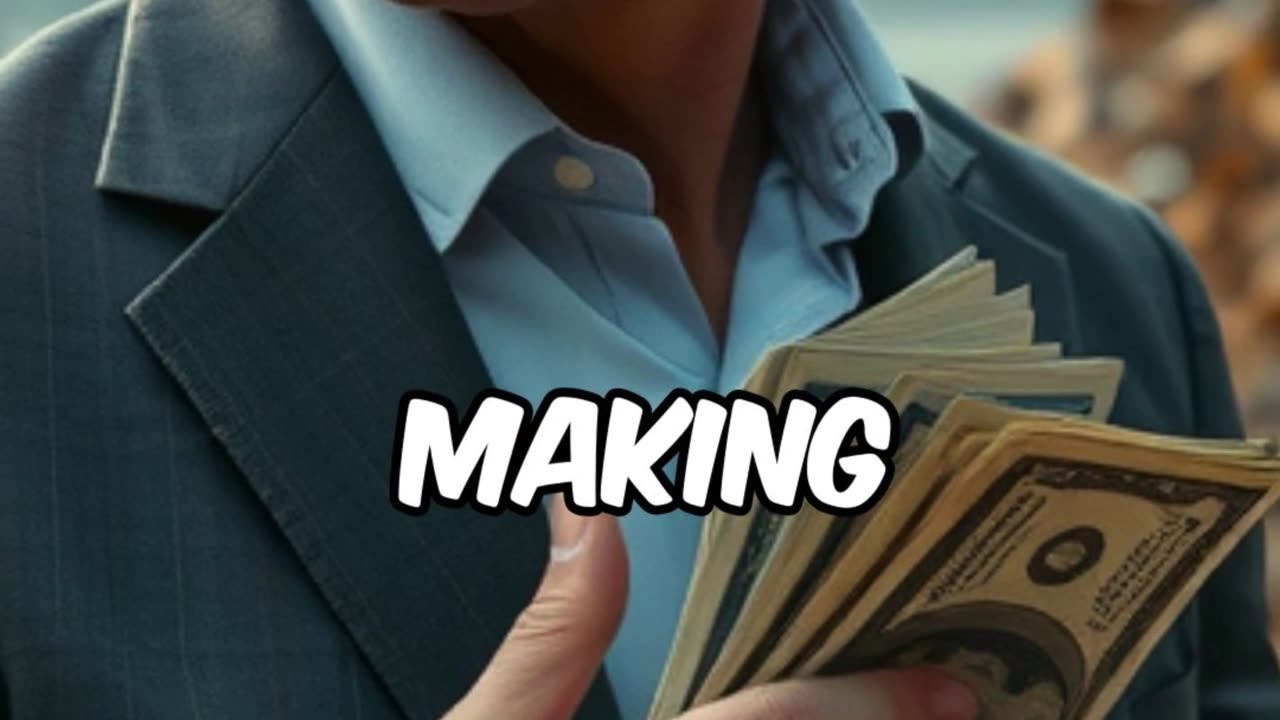Premium Only Content

Why Recycling Is Mostly a Scam ? #Recycling #Eco #Sustainability
Why Recycling Is Mostly a Scam
Introduction: The Dirty Truth About Recycling
For decades, we’ve been told that recycling helps save the planet, reduces waste, and protects the environment. But what if most of what we recycle never actually gets recycled? What if big corporations are pushing recycling to make us feel responsible—while they continue polluting at record levels?
In this video, we expose why recycling is mostly a scam, the shocking truth about what happens to your plastic, and how companies are profiting from a broken system. If you think you’re helping the planet by tossing plastic into the blue bin, you might want to think again.
#RecyclingScam #ZeroWaste #Sustainability #PlasticPollution #EcoFriendlyLiving
1. The Myth of Recycling: Why It Doesn’t Work
We’ve been led to believe that if we sort our plastic, glass, and paper properly, they’ll be reused to create new products. In reality, most recyclables never make it past the sorting facility.
Here’s why recycling is failing:
• Only 9% of plastic ever produced has been recycled.
• Many plastics aren’t recyclable—even if they have a recycling symbol.
• Contamination ruins batches—one dirty item can send an entire load to the landfill.
• Recycling is expensive—many cities can’t afford proper facilities.
• Exporting waste to other countries—the U.S. and Europe send their waste to poorer nations, where it often ends up in landfills or the ocean.
Most of what we recycle ends up in landfills, incinerators, or the environment, proving that the system is deeply flawed.
#RecyclingLies #EcoMyths #Greenwashing #ClimateChange #SustainableLiving
2. The Plastic Industry’s Big Lie
Did you know that big oil and plastic companies were the ones who pushed for recycling in the first place? The truth is, companies like ExxonMobil, Dow, and Coca-Cola have known for decades that plastic recycling doesn’t work—but they promoted it anyway to avoid responsibility for the waste they produce.
How Big Business Manipulated the Public:
• In the 1970s, oil companies promoted plastic recycling to shift the blame onto consumers.
• Corporations use “green” marketing to make people think plastic is sustainable.
• Recycling symbols on plastic are misleading—many of those items can’t actually be recycled.
• Instead of reducing plastic production, companies keep making more, knowing most of it will never be recycled.
While we’ve been sorting our recyclables, these companies have been producing more plastic than ever, making billions while the planet suffers.
#PlasticWaste #CorporateGreed #GreenwashingExposed #SustainableFuture #RecyclingMyth
3. Where Does Your Recycling Actually Go?
Ever wondered what happens after you toss something in the recycling bin? Spoiler alert: most of it doesn’t get recycled.
Here’s where your recyclables REALLY go:
• Landfills – If items are dirty or mixed, they go straight to the dump.
• Incinerators – Burning waste creates toxic pollution.
• Overseas – Countries like Malaysia and Indonesia receive U.S. and European trash, much of which gets dumped.
• Downcycled – Some materials are turned into lower-quality products but can’t be recycled again.
The Ugly Truth:
Just because something can be recycled doesn’t mean it will be. Without profitable markets for recycled materials, much of what we try to recycle is wasted.
#WhereDoesTrashGo #RecyclingProblems #LandfillWaste #WasteManagement #ClimateAction
4. Why Most Plastics Aren’t Recyclable
Plastic is the biggest recycling scam of all. While we think of plastic as recyclable, most types are impossible or uneconomical to process.
Types of Plastic and Their Fate:
1️⃣ PET (Plastic Bottles) – Recyclable but often contaminated.
2️⃣ HDPE (Milk Jugs, Detergent Bottles) – Recyclable, but demand is low.
3️⃣ PVC (Pipes, Packaging Film) – Not recyclable.
4️⃣ LDPE (Plastic Bags, Wrappers) – Rarely recycled.
5️⃣ PP (Yogurt Containers, Straws) – Difficult to recycle.
6️⃣ PS (Styrofoam) – Almost never recycled.
7️⃣ Other (Mixed Plastics) – Non-recyclable and often incinerated.
Since plastic degrades each time it’s processed, even recyclable plastics can only be reused a few times before becoming waste.
#PlasticCrisis #RecyclingReality #StopPlasticPollution #WasteProblem #EcoFriendly
5. How Companies Profit from Recycling (While We Get Scammed)
If recycling doesn’t really work, why do companies keep pushing it? Because it’s profitable for them—but not in the way you think.
How Businesses Benefit from the Recycling Scam:
• Avoiding Responsibility – Instead of reducing waste, they push responsibility onto consumers.
• Selling “Recycled” Products – Many “eco-friendly” products still end up in landfills.
• Recycling Fees – Some companies charge customers for “sustainable packaging” but don’t actually recycle.
• Government Subsidies – Waste management companies receive funding while still dumping recyclables.
Meanwhile, consumers are left thinking they’re making a difference—when in reality, corporations are profiting off a broken system.
#RecyclingScam #CorporateFraud #EcoLies #GreenWashing #SustainableBusiness
6. The Better Solution: What Actually Works?
If recycling isn’t the solution, what should we do instead? The key is reducing waste before it starts.
REAL Solutions to the Waste Crisis:
✅ Reduce Plastic Use – Avoid single-use plastics whenever possible.
✅ Refuse & Reuse – Choose reusable products over disposables.
✅ Compost Organic Waste – Food waste doesn’t belong in landfills.
✅ Support Circular Economy – Buy products that can be truly reused or repurposed.
✅ Hold Companies Accountable – Demand better packaging and policies.
Instead of putting faith in a broken recycling system, we need to focus on waste reduction and responsible production.
#ZeroWaste #ReduceReuseRecycle #SustainableSolutions #LessWaste #EcoConscious
7. Governments & Corporations Need to Fix the Problem
While individual actions help, the real change must come from governments and corporations.
What Needs to Happen:
• Ban Single-Use Plastics – Many countries have started, but more action is needed.
• Improve Recycling Infrastructure – Make it easier and more effective.
• Force Companies to Reduce Plastic – They should be responsible for waste, not just consumers.
• Invest in Real Solutions – Biodegradable alternatives, refillable packaging, and compostable materials.
Without government intervention and corporate accountability, the recycling scam will continue while the planet pays the price.
#PolicyChange #BanPlastic #HoldCorporationsAccountable #EcoLaws #SustainableFuture
Conclusion: The Recycling Lie Exposed
Recycling was meant to help the planet, but in reality, it’s been used as a cover-up for corporate pollution and waste mismanagement. The real solution isn’t just recycling—it’s reducing waste, holding corporations accountable, and demanding better policies.
So next time you throw something in the blue bin, ask yourself: Is this really being recycled, or am I just part of the scam?
If you found this video eye-opening, like, comment, and subscribe to help spread the truth about recycling!
#RecyclingExposed #Greenwashing #WasteCrisis #ClimateChangeAction #SustainableLiving
-
 33:32
33:32
ZeeeMedia
1 day agoKidnapping Cover-Up, Unvaxxed Kids Healthier, EU's New World War | Daily Pulse Ep 105
6.57K19 -
 11:04
11:04
Nate The Lawyer
3 days ago $0.34 earnedJudge, Mayor & 13 Democrats Arrested In Massive Mail-In Voter Fraud Scandal
1.02K21 -
 50:15
50:15
daniellesmithab
1 day agoKick-Starting Careers for Young Albertans
4.02K -
 39:01
39:01
Stephen Gardner
15 hours ago🔥This Will Leave You FURIOUS... What’s Really Going On?
57K115 -
 19:33
19:33
DeVory Darkins
16 hours ago $9.49 earnedBREAKING: Charlie Kirk's shooter in custody after making chilling confession
29K138 -
 2:12:43
2:12:43
TimcastIRL
10 hours agoErika Kirk Addresses Public After Charlie Kirk Assassination, Live Coverage | Timcast IRL
408K406 -
 30:59
30:59
The Charlie Kirk Show
10 hours agoCharlie Kirk's beloved wife, Mrs. Erika Kirk addresses the Nation.
559K1.58K -
 1:53:28
1:53:28
Man in America
18 hours agoLIVE: Assassin Arrested? Civil War? Are We Being Played?? | LET'S TALK
108K132 -
 2:10:33
2:10:33
Badlands Media
15 hours agoOnlyLands Ep. 24: Processing Tragedy, Cancel Culture, and the Next Spark
71.8K29 -
 2:27:53
2:27:53
TheSaltyCracker
10 hours agoGot Him ReeEEStream 9-12-25
290K382